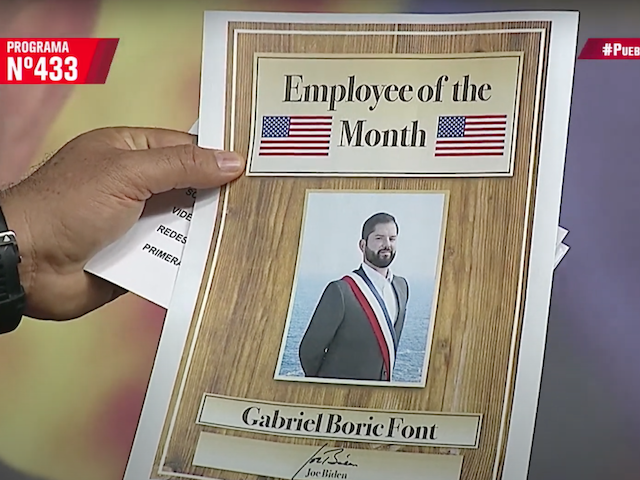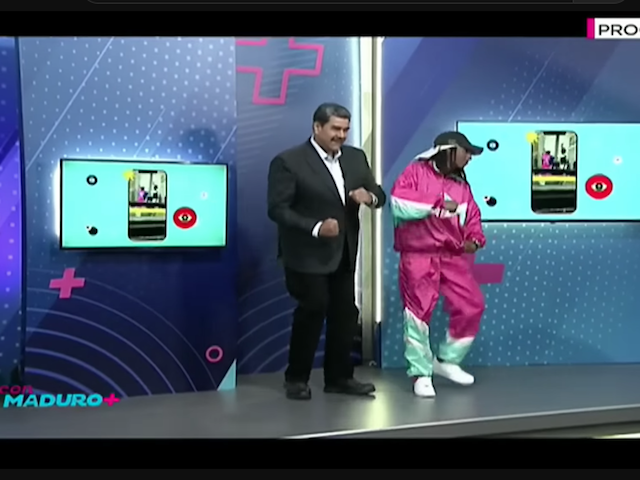CARACAS, Venezuela — I have been living under the socialist “Bolivarian revolution” for 25 years – and I still can’t quite understand the obsession regime personalities have with being a TV superstar.
Venezuela may have a million problems – such as poverty, inflation, hunger, no proper access to health care, no access to education, and the worst migrant crisis in the region — but don’t you dare suggest these things are a higher priority than the ruling socialist party’s TV shows.
Perhaps it is just another way to exercise the absolute power they wield over the country, or copycat syndrome after late dictator Hugo Chávez worked so hard to be remembered as a talk show host. Whatever the case, the socialist regime controls all of Venezuela’s media and it has built up extensive state-owned media empire that eclipses what few remaining private outlets exist. Shows starring socialist dictator Nicolás Maduro and his henchmen are the end result of the regime’s media hegemony.
The start of it all was Hugo Chávez himself who, after barely three months in power, launched Aló Presidente (“Hello President”) in May 1999, when I was 11 years old. I remember there was quite the fuss about it even if I at the time didn’t really understand why.
Aló Presidente had a simple premise: it was a lengthy multi-hour radio show hosted by Chávez, where he talked about government, politics, or his topic of choice. You, as a regular Venezuelan citizen, were supposed to be able to call in and talk to Chávez directly.
The show later expanded into television and ditched the premise of being able to talk to Chávez. His government ministers would often be seated as part of the audience and the show would feature “illustrious” guests such as his mentor, Cuban dictator Fidel Castro, Bolivia’s Evo Morales, and other regional leftist leaders.
While the show had moments of “levity,” such as Chávez’s telling the story of his struggle against diarrhea during an official event, the show also marked some of the most significant developments in Venezuela’s troublesome history – and Venezuela’s descent into socialist misery. Chávez was always the star.
It was during one of the show’s episodes that Chávez threatened Colombia by sending troops and tanks to the Venezuela-Colombia border in response to Colombia’s attack on one of the many camps of the Marxist Revolutionary Armed Forces of Colombia (FARC) terror group, killing the FARC leader known as Raúl Reyes.
In 2002, during another broadcast, Chávez, using a whistle, fired executives from the state-owned PDVSA oil company and replaced them with regime loyalists, sparking not just a year-long crisis in the country, but also marking the very first chapter of the collapse of Venezuela’s oil industry — our one reliable source of profits as a country.
Another emblematic example took place in 2010. In that episode’s live broadcast, Chávez, walking around Caracas’ main Bolivar Square, began targeting several historic buildings with his finger, ordering their immediate expropriation. One of the buildings, La Francia, served as a center for many career jewelers, all of which were left out of work on a whim that afternoon.
The “success” of Aló Presidente was replicated by many leftist leaders in the region, including in Brazil, Argentina, Ecuador, Bolivia, and Uruguay.
Aló Presidente was the “Supreme Commander’s” show and, without Chávez, there can be no Aló Presidente. The show went on an indefinite hiatus in January 2012 as Chávez continued to receive medical treatment for an undisclosed form of cancer that would eventually claim his life in March 2013.
As his successor, socialist dictator Nicolás Maduro continued in his leader’s footsteps, making shows of his own, ranging from a salsa radio show launched in 2016 to his latest one, Con Maduro+ (“With Maduro Plus”), a show launched in April that goes hand-in-hand with Maduro’s desire to “rehabilitate” his image and become a TikTok influencer.
Relatively speaking, Con Maduro+ is closer to an afternoon talk show than Aló Presidente, as Maduro wears colorful suits and chats with guests – colorful imagery that steers away from the traditional socialist red hues. Maduro even has his own “Artificial Intelligence” sidekick.
In contrast to Maduro’s show, which seeks to present itself as friendly and trendy, there is a television show spawned from the roots of the now long gone Aló Presidente that has no shame in hiding its socialist foundations: the very pure essence of a socialist show, Con el Mazo Dando (“Hitting with the Mallet”).
This show, which takes its name from a popular saying that roughly translates to “begging God and hitting with the mallet” – praying for luck, but working hard – is hosted by socialist strongman and suspected drug lord Diosdado Cabello. In a way, this show is a socialist liturgy. The show often features large images of Maduro and Chávez in the background, with Cabello’s now infamous prop club and part of the show’s namesake.
El Mazo is a very structured show where Cabello spreads the regime’s gospel – insults and intimidates politicians, journalists, and everyone who is not an ally of the regime all the same. Telephone conversations between opposition politicians are often leaked, people are insulted, names are named. It is all televised state authoritarianism. You can get thrown in prison for 20 years thanks to our “hate speech” laws, but they clearly do not apply in any way to this show.

Diosdado Cabello holds a poster declaring leftist President of Chile Gabriel Boric the U.S. “employee of the month” after Boric condemned Venezuela’s human rights abuses at a summit in Brazil, May 31, 2023. (Con el Mazo Dando/Screencap)
One of the most infamous segments is the Cartelera, or bulletin board, in which Cabello, in a very ritual-esque manner, presents printed cutouts of news headlines and social media posts pinned to a cork board.
Cabello will go through each of these printed cutouts one by one and, judging them depending on their content, scribbles over things that defy the regime and doodles checkmarks on stories he likes.
As this October Twitter post suggests: “if you don’t like your job, think about the person who has to collect Diosdado’s tweets, print them, cut them out, and stick them on a bulletin board so that he can then scratch them with a red marker.”
Something to keep in perspective if you’re going through a rough time at your job.
It has always been known that the Maduro regime actively scouts social media to curb dissenting messages, and El Mazo gave us a reminder of that just recently. We got a “confirmation,” or rather, a reminder, that Cabello’s team actively trawls social media for anti-revolutionary posts in October.
In October, Twitter user RubbyCobain, who identifies herself as a Venezuelan citizen, quoted a news post that featured Cabello, giving the socialist strongman the nickname of “The Devil’s Gerber Baby.”
Cabello would actually react to the tweet and have it featured in his show shortly afterward, “laughing” at the matter. Thankfully, the woman who made the original joke has been living in Argentina for some time now as one of the over 7.7 million Venezuelans (and counting) that have fled from socialism. But for those still living here, it’s a reminder to tread lightly.
Other, lower-ranked members of the socialist regime have their own local radio and sometimes television shows, but Maduro and Cabello’s respective shows tower above them all in reach, scope, and production budgets.
If you ask me, had Chávez chosen to become a television anchor instead of pursuing a military career and eventually leading this socialist regime, maybe Venezuela would have stood a chance.
Christian K. Caruzo is a Venezuelan writer and documents life under socialism. You can follow him on Twitter here.

COMMENTS
Please let us know if you're having issues with commenting.